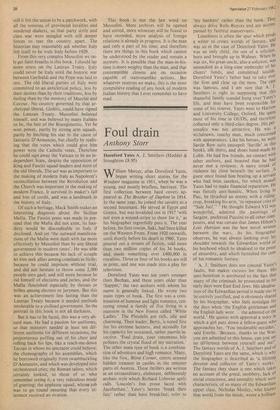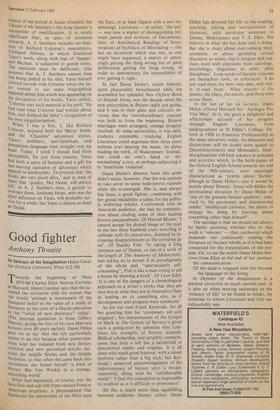Foul drain
Anthony Storr
William Mercer, alias Dornford Yates, began writing short stories for the Windsor magazine in 1911, when he was a young, and mostly briefless, barrister. The first collection between hard covers ap- peared as The Brother of Daphne in 1914. In the same year, he joined the cavalry as a second lieutenant. He served in Egypt and Greece, but was invalided out in 1917 'with not even a wound-stripe to show for it,' as his biographer regretfully puts it. The year before, his first cousin, Saki, had been killed on the Western Front. From 1920 onwards, until shortly before his death in 1960, Yates poured out a stream of fiction, sold more than two million copies of his 34 books, and made something over £400,000 in royalties. Three or four of his books are still in print, and one was made into a play for television.
Dornford Yates was ten years younger than Buchan, and three years older than 'Sapper,' the two authors with whom his name is generally linked. He wrote two main types of book. The first was a com- bination of humour and light romance, cen- treing round a family of five living in a mansion in the New Forest called 'White Ladies.' The Pleydells are rich, idle and charming. Their leader, Berry, is noted first for his extreme laziness, and secondly for his capacity for sustained, rather puerile in- vective. 'Foul drain, your venomous bile pollutes the crystal flood of my narration.' The other main type of book is a combina- tion of adventure and high romance. Many, like the first, Blind Corner, centre around hidden treasure in castles in the remoter parts of Austria. These thrillers are written in an extraordinary, elaborate, deliberately archaic style which Richard Usborne aptly calls 'Lincoln's Inn prose laced with Jacobethan.' Yates's heroes 'break their fast' rather than have breakfast; refer to 'my bankers' rather than the bank. They always drive Rolls-Royces and are accom- panied by faithful manservants. Loneliness is often the spur which prods a writer to create worlds of fantasy, and was so in the case of Dorn ford Yates. He was an only child, the son of a solicitor, born and brought up in Walmer. When he was six, his great-uncle, also a solicitor, was unmasked as a long-time embezzler of his clients' funds, and committed suicide. Dornford Yates's father had to take over the firm and clear up the mess. The case was famous, and I am sure that A. J• Smithers is right in supposing that this shameful family scandal hung over-Yates's life, and may have been responsible for some of his reserve. Yates went to Harrow and University College, Oxford. He spent most of his time in DUDS, and therefore collected only a third-class degree. His Per- sonality was not attractive. He was a, withdrawn, touchy man, much concerned with appearances. Like his heroes, he wore Savile Row suits (misspelt 'Saville' in this book), silk shirts, and shoes hand-made by Lobb. He had few friends, no contact with other authors, and boasted that he had never met a reviewer. A nasty streak of violence lay close beneath the surface. A guest once found him beating up a servant who had been careless, for which assault Yates had to make financial reparation. He was fiercely anti-Semitic. When living in Pau, he thrashed an enemy with a riding- crop, breaking his arm, 'to repeated cries of "Sale Juif." ' He thought Edward VII was wonderful, admired the paintings of Sargent, preferred Puccini to all other com- posers, and was certain that James Hilton's Lost Horizon was the best novel written between the wars. As his biographer observes, he was always looking over his shoulder towards the Edwardian world of his boyhood which he idealised to the point of absurdity, and which furnished the core of his romantic fantasy.
A. J. Smithers does not conceal Yates's faults, but makes excuses for them. His anti-Semitism is attributed to the fact that many of the criminals he prosecuted in his early days were East End Jews. His idealisa- tion of the Edwardian period is made out to be entirely justified, and is obviously shared by his biographer, who feels nostalgia for the days when 'the English gentleman and the English lady were... the admired of the world.' He quotes with approval a story in which a girl puts down a fellow-guest who approaches her. 'You intolerable outsider, said Estelle. 'Because, thanks to the War, you are admitted to this house, can you see no difference between yourself and me?' The fantasy worlds of A. J. Smithers and of Dornford Yates are the same, which is whY the biographer is described as 'a lifelong devotee and collector of Yates's works.' The fantasy they share is one which takes no account of the greed, snobbery, lack of social conscience, and unreality which were characteristic of so many of the Edwardian upper class. Nicholas Mosley, who knows that world from the inside, wrote a brilliant expose of the period in Julian Grenfell, but I doubt if Mr Smithers's life-long fantasy is susceptible of modification. It is surely significant that, in spite of extensive research, A. J. Smithers includes no men- tion of Richard Usborne's masterpiece, Clubland Heroes, in which Dornford Yates's work, along with that of 'Sapper' and Buchan, is 'subjected to gentle irony. The omission must be deliberate. One assumes that A. J. Smithers cannot bear fun being poked at his idol. Yates himself crossed swords with Usborne when the lat- ter wanted to use some biographical material about him which was appearing on the dustjackets of his books. Yates cabled, `Usborne uses such material at his peril.' He had read what Usborne had written about hint, and disliked the latter's recognition of his own inegalitarianism. When I was a boy, I, like Richard Usborne, enjoyed both the 'Berry' books and the `Chandos' adventure stories. Yates's snobbery, anti-Semitism, and Pretentious language went straight over my head. Today, I think I should find them unreadable, for just those reasons. Yates had both a sense of humour and a gift for fast-moving narrative of adventure which appeals to adolescents. To pretend that 'the books are very much alive,' and to state of thent that 'quality, like blood, will always tell,' as A. J. Smithers does, is grossly to overrate them. Anthony Hope, who was the Chief influence on Yates, will probably sur- vive for a while; but Yates is almost as dead as Ouida.





































 Previous page
Previous page